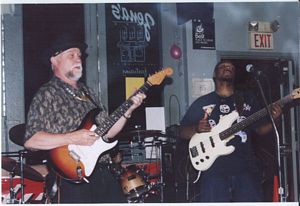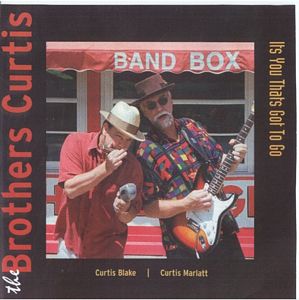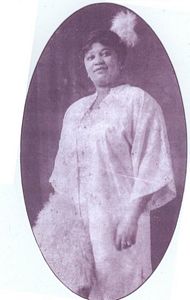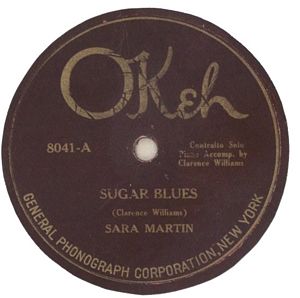
I've Got A Mind To Ramble

Curtis Gets His Kicks

Every couple of years, bluesman Curtis Marlatt returns to his hometown like the prodigal son to enjoy the fatted calf or café. I caught up with him again during Derby week, before his performance with the Kicks at Zena's Café on May 5. Curtis and his wife Christina were on their way back to Minneapolis after attending the New Orleans Jazz Festival and Ponderosa Stomp, returning via Mississippi, visiting many of the holy blues shrines in the Delta. Curtis has been active on the blues scene in the Twin Cities, hosting a blues jam at the Triangle Bar every Tuesday night for four-and-a-half years. Incidentally, he showed up at Lisa's Oak Street Lounge for the regular Wednesday blues jam the night before and got reacquainted with some of Louisville's veteran musicians like Lamont Gillispie, Mark Stein, Sue O'Neil and Dave Witherspoon.
Other active clubs where Curtis occasionally plays are Neuman's Bar, the oldest bar in Minnesota; Viking Bar, where Bonnie Raitt has played; the Narrows, which attracts national acts and Dixie's on Grand, which is a Cajun restaurant and jazz club. To survive Curtis has had to adapt to a variety of styles, mixing a little soul and jazz into the blues. When he plays at Hollywood's Prior Lake, it's the Sessions of Soul and when he is at Muddy Waters in Prescott, Wisconsin, he plays with Minnesota harpman Curtis Blake as the Delta Duo.

Both Curtises have teamed up together as The Brothers Curtis, recording a CD in 2003 titled "It's You That's Got to Go" on Blue Bayou Records. They share vocals, with Marlatt's guitar meshing nicely with Blake's chromatic and diatonic harps. There are three original songs, including the title track, "I Made My Girl Friend My Wife, " and an updated version of his autobiographical "Something's Wrong" from Marlatt's 1992 Louisville recording. The CD won a regional award and was entered in the International Competition in Memphis.
Curtis still maintains his "bourbon smooth blues" sound and the duo is now sponsored by Old Forester bourbon. Curtis said the blues scene is waning in the Twin Cities - like several other regions - and the area is becoming more of a jazz Mecca. Christina is actively involved in the Greater Twin City Blues Music Society. The organization has been adopting local blues musicians, like JoJo Williams and Big George Jackson, to raise funds and give them some deserved recognition.
Music usually starts a little late at Zena's, so after several old friends and relatives arrived and were warmly greeted, Curtis got the band motivated at 11 P.M. The Kicks still include troopers Paul Bennett on his white Fender bass and Darnell Douglas attacking the drums. It had been two years since they last backed up Curtis, but it was as if they were starting the second set after a long break. Paul rocks from side to side, plucking his five bass strings and Darnell had several powerful solos on the skins and cymbals. Curtis has maintained his recognizable guitar sound when he strikes the opening chords of his songs. His sunburst Stratocaster produces jazzy dreamy melodic riffs that contrast with sharp clear notes that tear straight to your soul. Curtis's smoky voice conjures up a bluesy Boz Scaggs.
The first set included "Tired of Paying My Dues," "My Baby Caught the Train," and the traditional "Keys to the Highway." Curtis frequently pays tribute to James `Thunderbird' Davis by playing his signature song "Check Out Time." Following an appearance by Davis at an early Garvin Gate Blues Festival where Curtis backed him up, Curtis briefly toured with the rediscovered singer until his untimely death in 1992. Curtis's son, Jason, was intently watching every move his dad made during the first set and was ready to sit in on guitar for the second set. If you want to know more about Curtis, check out his web site at www.curtisbluz.com.
Sugar Blues

Every couple of months I visit Harold Maier at Twice Told to check out his used books and records. Harold has never failed me, for I always find something to buy and meet someone of interest in his shop at 1572 Bardstown Road. Interesting and strange people seem to attract each other. Harold has often threatened to set up a psychoanalysis couch for his customers and hang-outers that participate in his therapy sessions. The last time I was there he said someone who was renovating an old house had found a stack of old `78s. Harold bought the records, with me in mind. Among the Fats Waller, Lil' Armstrong, Mabel Scott and Bull Moose Jackson disks was Sara Martin's "Sugar Blues." Bingo! I was holding a fragile piece of Louisville's blues history in my hands. Sara recorded this, her first song, on October 17, 1922 in New York City for Okeh records. She was accompanied by Clarence Williams on piano, who was also the composer. Martin's precise, slow, high-pitched voice cries out over Williams' rather stilted keyboard playing. "Sugar Blues" became one of her biggest hits and started a recording career that continued from 1922 to 1928 with over 130 records. Louisville musician and historian Pen Bogert has done some excellent research about her life, writing the liner notes for the four-volume CD set of Sara Martin that was issued by Document Records in 1995. One of his sources of information was Ola Thornton (Withers), Sara's adopted daughter, who Pen interviewed in 1992 as part of the Kentuckiana Blues Society's Blues Oral History Project. When Sara was singing, recording and acting on the road from 1917 to 1927, Ola was a young girl living with her aunt. Her recollections are sketchy during this period and are mostly based on stories her mother told after she came back to Louisville. When Sara returned, she became active in church. singing gospel music, continued her talents as a seamstress and cared for senior citizens in her home. Sara's colorful life included five husbands, performing in vaudeville on the Theater Owners Booking Association (TOBA) circuit and recording with Clarence Williams, Sylvester Weaver, W.C. Handy Orchestra, Fats Waller, Sidney Bechet and the Clifford Hayes Jug Band. I won't try to redo another biography of Sara Martin but will share some of the personal stories Ola told during her interviews. Unfortunately, Ola passed away last year.
When Sara first left for New York, she knew it was going to be cold, so she took her long underwear. When her RKO agent, Mr. Sales, saw that he said, "You cannot come here and sing with those things down in your stockings." They were very inappropriate for the kind of lifestyle she was going into. Ola said, "it hurt her mother's feelings because he made her get rid of all the clothes she had made. He redressed her in New York outfits and during the first year Sara thought she would freeze to death up there in the cold." RKO tried to "improve" Sara's stage presence, by having nine diamonds mounted on her teeth. This would make her mouth glitter when she sang. Later when times were tough Sara had the diamonds removed and pawned them at Lemon's Jewelers in order to pay the rent.
When Sara was a club star in New York she gave Cab Calloway, who was just a ticket agent at the theater, a spot on the bill. She also gave billings to vibraphonist, Lionel Hampton, who was also from Louisville. Ola said, "whenever mother saw talent she would give them a place on her show."

Near the end of Sara's career, she was getting weary of the tough life on the road and wanted to make the next good record her last and come home. But every time another record would come out, she would change her mind and make another one. Ola told the story of when her mother was performing in Detroit. Sara went out on stage and tried to sing and nothing came out. She tried to sing again and nothing came. Clarence Williams gave her the downbeat two or three times. Sara went backstage, gargled and tried everything. She came back out and still could not sing. Then Sara passed out on stage and when she was revived back stage she made up her mind that was the end of it, no more singing the blues. Sara Martin returned to Louisville in 1927. In 1930, Mr. Sales came to Sara's dilapidated house at 1728 Walnut St. to try to persuade Sara to go back to New York to make some more records. She told him, "I'm singing for the Lord." He said, "You might be singing for the Lord, but it don't look like the Lord has done much for you." Sara replied, "That's all right, but I can sleep at night." She would never go back.
"Sugar Blues" will have a treasured place in my record collection.